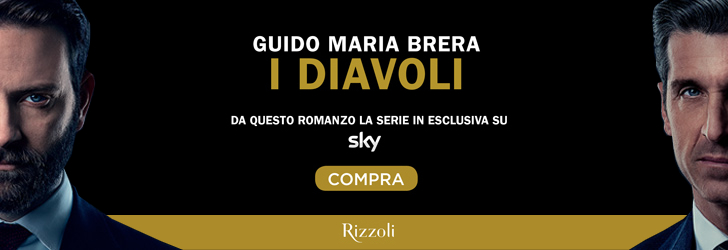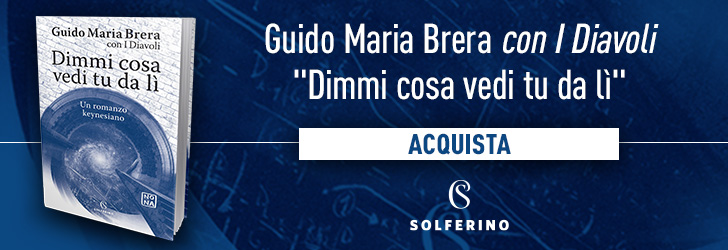
Decodificare il presente, raccontare il futuro
TREDICESIMO-PIANO
gio 2 luglio 2020
ONCE UPON A TIME, THERE WAS MASSIMO RUGGERO
I arrived in London in the early ‘90s. My hunger for life pulsated to the rhythm of the Victorian palaces of Kensington and Notting Hill, still full of squatters: it seemed impossible I could satiate myself. I left the eternal city behind me, with its enchanted atmosphere and the universities crossed by the utopias of the movement. I chose the blinking realism of the City, the unstoppable rise, the promises of success. And their dark implications.
London in the 1990s is the counterculture of squatters and the City’s flashing beacon, the wind of rebellion and the swelling of new bubbles of financial speculation. For Massimo Ruggero, this is the city where the enchantment of the past fades to make way for a roaring and cynical future. This time the tape rewinds on the existential watershed of the iconic protagonist of Guido Maria Brera’s The devils (again in bookstores in the new Rizzoli edition for the release of the TV series of the same name).
***
I arrived in London in the early ‘90s. The last recession was still biting hard. The first Gulf War marked the first conflict in the world to come out of the blocs. Fratricidal violence ran to Yugoslavia, the two Germanies made their unification official.
Nothing hinted to what was to come.
My hunger for life was like the Victorian palaces of Kensington and Notting Hill, still full of squatters: it seemed impossible I could satiate myself, just as it seemed impossible for those buildings to be sold for millions of pounds shortly.
I left behind my city, Rome, and my Country as well. It was the time of “the Panther”: schools and universities were occupied, the air was crisp. I looked with curiosity at what looked like a return to the seventies, but I wasn’t willing to participate. I wouldn’t have committed myself to a losing bet. It actually turned out to be nothing more than a blaze, and went off fast.
For a 20-year-old, London at the time had a charm that today’s London is incapable of having. There was his recent past, which had marked a generation with the musical waves of the previous thirty years. There was the outpost of finance in Europe, the City, which exerted an enormous attraction on many young graduates who didn’t know what to do with their lives.
I was one of those. Uncertain about the direction to take but full of an angry energy. Torn between a drive for rebellion and a desire to climb the world as it was. To get somewhere, to travel, to be contemporary. That desire got the better of me, that’s how my career began.
The City was flashing like a beacon.
Finance was expanding and internationalizing, globalization was calling. Financial deregulation was a direct consequence of the fall of the blocs, the free movement of capital was to become the engine of the world. I was in the right place at the right time.
I joined an American bank that put me on its training program. It was a kind of military training for cadets with a degree and a lot of ambition: in two years, you had to go around all the departments of the bank, work day and night, get appreciated from a desk in order to be hired on a permanent basis. Extenuating, but I didn’t feel the fatigue.
I was hired after six months, the first rotation in the fixed income department. The Italian market was boiling, divided between the eternal propensity for failure and the new European opportunity to become a stable and reliable market. Italy had become a gold mine for the bank, and I was benefiting from it.
Besides hunger, though, it always takes luck. Widening the field, recruiting was no-holds-barred. Being Italian brought me tempting offers, I could fantasize about leading hedge funds, approach my name to that of legendary bankers, up to the American at the top of the hierarchy of the myth: Dominic Morgan.
What’s more, at that time, an alien called Mario Draghi had descended on the Italian Treasury, and he was the most competent of them all. A lucky addition for me and for any Italian who worked in the City. Draghi created a task force of high profile experts, banks and international investors trusted his authority.
I climbed position after position in the bank. As a trader, I talked to investors, wrote research bulletins, helped economists decipher my country. London around me changed its skin, pulled by the City. Houses were doubling in value, squatters were being evacuated, Yugoslav refugees were returning to their new countries.
My life as a young banker was hectic. It was difficult to keep up with me, to follow my rhythms, to understand them. I had impossible working hours and leisure was wild clubbing. The last wave of English creativity poured into electronic music, raves that started on Friday nights and ended on Sunday afternoons. In that world there were no barriers, everyone took part: the aristocratic scion and the young banker on the launching pad; the university student and the unemployed former punk on his way to extinction.
Then, that season would give way to much more exclusive clubs, contemporary art exhibitions, fake meeting places always attended by the same people.
Even in the bank, there were fewer barriers than before. The generational turnover was unprecedented, the old bankers of the City were being undermined without hesitation, technology operated a natural selection. We, the young people, believed in endless growth, the long lasting boom announced on a Wired cover, our contemporary bible. We were the shrewd children of the new enlightenment and brought mountains of money to the bank.
Still, at the end of the millennium, everything was beginning to get confusing.
Certainties were shattering, even the feeling that history was running in a precise direction was faltering. I felt something unstable, something deeply wrong. I was living along a border.
On the one hand, I was fascinated by my peers parading in every corner of the planet against the G8, the emblem of imminent globalization, a protest as far from my present as it was close to my past. On the other, my life was wrapped in that exaggeration of private planes and thousands of pounds spent entertaining clients and counterparts. The 1990s would be the biggest bubble in history. And I was right there, under its stretching surface.
When the year 2000 came, the much-dreaded technological collapse didn’t take place. We were under the illusion that the Millennium began under good auspices. Almost immediately, however, the Nasdaq bubble burst and the technology stocks plummeted. There were uncountable comparisons with the 1929 crisis, yet market volatility and financial diversification cushioned the shock, and the system held up.
It was enough to arrive in 2001 for history to begin again in earnest. In July, the marches against the G8 were repressed in blood, and I had to hide the shock, the upset that those images gave me. In September, the Twin Towers collapsed, and instead of indulging the emotion, I felt I had to go straight ahead. Because the machine was back up and running after a week. Because, even if the collective imagination was marked by shock, the gears of finance did not stop.
The frame was changing, but everything seemed to be in continuity, while a new ruling class was knocking on the doors of a Manhattan skyscraper.
I was only 30, and already a Senior banker. I felt that the crazy ride was over — but instead of finding peace, my doubts increased along with my bank account. At home, I was reading — secretly, even to a part of myself — a book that brought to the surface the contradictions of globalization: Empire, by Michael Hardt and Toni Negri.
Hardt taught at Duke, just like another old acquaintance of mine, at least as tormented as I was, who at that time was returning to London from the States. Professor Philip Wade.
The naive heat of the ‘90s was mine too, and it was over. Puff, burst like a bubble. I was becoming more and more aware that compromises would increase. I was helpless in the face of my torments. The only way out for me would have been to give it all up, but I didn’t. I had chosen the winning side.

